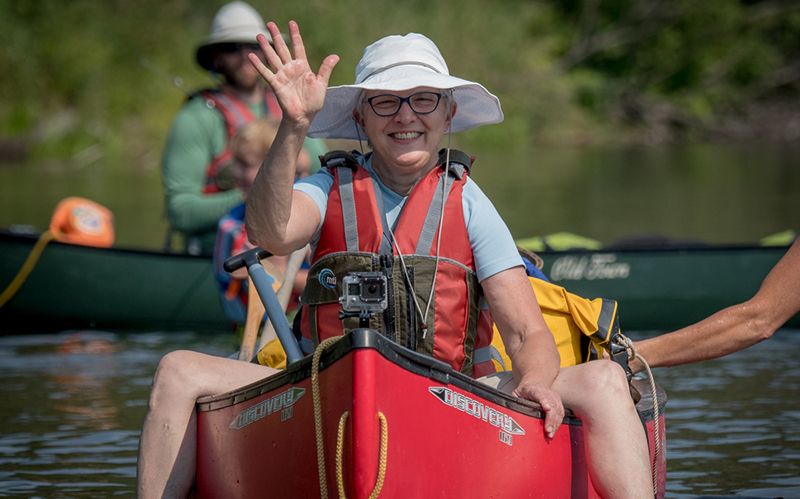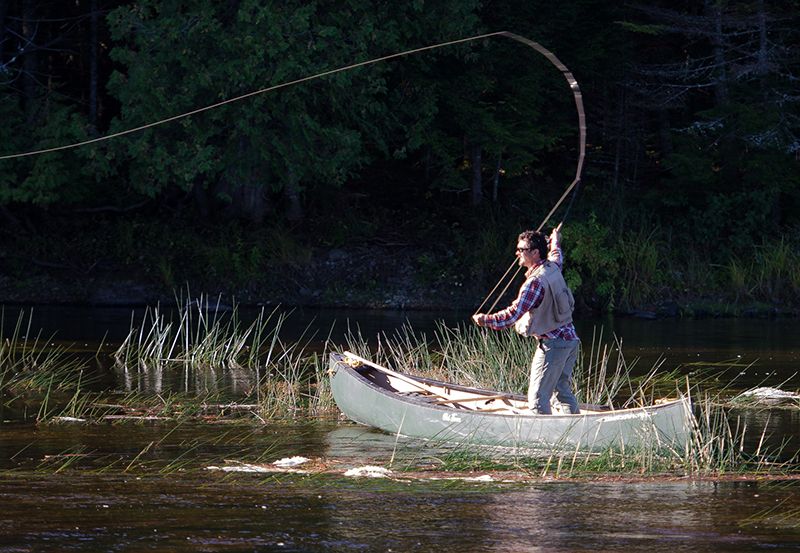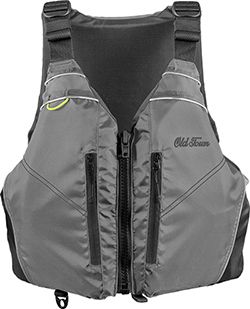Maine’s Best 3 & 4 Day Canoe Trips
Throughout 2018 we will feature a series of articles from guest-blogger Dave Conley, Master Maine Guide and owner of Canoe The Wild, a canoe guiding operation in Maine's Grand Lake region. Dave's decades of experience guiding canoe trips on North America's most scenic, and challenging, rivers has given him a wealth of knowledge on everything from trip planning and paddle techniques to wilderness cooking and safety protocol. We hope his wisdom inspires you to get out and plan an adventure of your own.
While many streams and rivers become unreliable for canoe tripping after the spring runoff, plans can be made throughout the summer on the St. Croix, Penobscot and Allagash Rivers due to dams at their headwater lakes. Even in a dry season, enough water is usually released to make a trip possible. For ideal short Maine canoe trips, I have chosen to feature three days on the St. Croix River and four days on the Allagash.
THE ST. CROIX RIVER
Designated as a Canadian Heritage River, the St. Croix flows along the eastern Maine border with New Brunswick, Canada, offering great wilderness scenery, moderate whitewater, maintained campsites and fishing for small mouth bass. The St Croix is well suited for families and groups of all ages with little or no experience and can be paddled all summer long.
With miles of quick water, numerous class I rapids, and a couple of class II rapids that can be paddled, lined or portaged, it's easy to see why the St. Croix is one of Maine's best canoe trips. The St. Croix is an ideal river to learn and improve basic paddling and camping skills. The more advanced paddler will appreciate the quick water, numerous rapids and may even want to try their skill at solo paddling or canoe poling.
Campsites located on the river's edge are rustic, with picnic tables, fire pit, outbox and space to pitch tents. Cooking can be over an open fire and or a compact camping stove. A more relaxed schedule allows time to swim, fish, read a book, and enjoy quality time with friends and family.
With numerous starting and ending points, a trip from 1-7 days is possible.

For the 3-day option with a more relaxed schedule (remember you're on vacation), starting in Vanceboro and taking out at Loon Bay, three days and 20 miles later is recommended. Keep in mind on day one, factor in for traveling to Vanceboro that morning, unloading, loading canoes, and connecting with your shuttle driver. Launching typically happens mid-morning. Arriving at your first campsite upriver of Little Falls by early afternoon allows time for setting up camp and other chores such as collecting, sawing and splitting fire wood, fetching water for cooking and washing, meal preparations and cooking. You'll want a little down time to enjoy fishing for small mouth bass, taking a swim or possibly exploring by canoe. Before you know it, it's time to eat supper and it's nice to finish up the dishes before dark! On day two, you'll take on Little Falls which, depending upon water level is typically an easy class II rapid. You'll want to scout this rapid to view obstacles and plan your best route. Portaging is an option. Camping in the Scott's Brook to Split Rock area campsites are just about right for day two. On the last day, you'll want to be underway by 9-9:30 AM, arriving at Loon Bay around noontime or early afternoon. This allows time to load up and be on your way home or to your next destination be late afternoon or early evening.
THE ALLAGASH WILDERNESS WATERWAY
The Allagash is Maine's best-known canoe trip and has attracted paddlers for more than a century. Henry David Thoreau ventured into this region more than 150 years ago by traveling into the Allagash via the Mud Pond Carry from the West Branch Penobscot watershed. The legendary Allagash is Maine's only designated Wild and Scenic River.
Allagash canoe trips are popular with families, scouts, teens, summer camps, as well as adult and youth groups. With its easy flowing river sections and its moderate whitewater on Chase Stream Rapids, the Allagash is well suited for ages 12 and up. It is one of the few eastern rivers that can be paddled for a week or longer without coming into contact with modern civilization.
If you're hoping to encounter wildlife, the Allagash is where you want to be. It has consistently been Maine's best canoe trip for spotting wildlife, including moose and eagles. With numerous put in and take out locations, outings can be planned from four to ten days.
The best times to paddle the Allagash depend on what you're looking for. Late May through mid-June is less travelled and the optimal time for brook trout fishing but be prepared for black flies and Mosquitoes. Late June through Labor Day weekend is the most popular time to paddle the Allagash. The days are warm and nights are cool. Early fall is an excellent time with fewer people, no bugs, and the beginning of fall colors.
At its headwaters, are numerous lakes including Chamberlain, Allagash, Eagle, and Churchill. The northern section taking you from Chase Stream Rapids to Allagash Village, involves mostly river travel; you'll be paddling Umsuskis and Long Lakes, Round Pond, and portaging around 40' Allagash Falls.
The region is rich in logging history, and there are numerous artifacts that can be explored from days gone by. You'll have a chance to visit the remains of Lombard stream haulers, a tramway from Eagle to Chamberlain Lake, and two locomotives on the shores of Eagle Lake.

With the four-day option, a trip from Round Pond to Allagash Village (35 miles) is recommended. Keep in mind that the first and last days typically tend to be ½ days on the river, launching around noontime of day one and ending by early afternoon of the last day. For those that want to put a few more miles on, start on Long Lake and end in Allagash Village (50 miles), but if you end up with a strong head wind when launching on Long Lake, you'll lose a day of paddling as you'll be camping near your launch location.
When launching at Henderson Bridge just upstream of Round Pond, you'll more then likely arrive early afternoon on Round Pond with figuring in the morning drive in from Allagash Village, launching and time spent at a North Maine Woods gate. The North Maine Woods charges fees to cross their lands and collects fees for the state of Maine for being on the Allagash, which is a state park. When camping on Round Pond, you're more than likely be treated to the song of the loon. If time permits, you can hike to the abandoned Round Pond Fire Tower, a 4.8-mile round trip with the trailhead being at the Tower Trail Campsite. Arriving early at camp on Round Pond and finishing up supper and chores, allows you daylight and time to paddle over to the inlet, a popular alder/marsh area where moose feed on aquatic vegetation anytime of the day with dawn and dusk being most active. Day two involves paddling on lively Round Pond Rips where precise bow maneuvers keeps the canoe off the rocks. Next will be Musquacook Deadwater, a great place to spot moose and bald eagles. Stop where Musquacook Stream enters the Allagash and take a few casts for brook trout! Choose a campsite that afternoon near Cunliffe Depot, Ramsey Ledges or push on to Allagash Falls. Be sure to stop just upstream of Cunliffe Depot on river right, where a path leads you back in time to the abandoned Lombard gas and stream haulers, once used to move logs to the river's edge awaiting the spring runoff and log drive!
Approach Allagash Falls with caution and watch for the portage signs. The portage is on river right. Allagash Falls is a 40' drop over many sharp rocks and outcroppings of ledge. After completing the portage, take time for lunch and exploring the falls. Some (with caution and checking for depth first) enjoy jumping from ledges well below and downstream from the falls, floating 50 yards or so before climbing out and repeating! Plan on camping at Allagash Falls or one of many sites just below Allagash Falls such as McKeen Brook and the Big Brook Campsites. It is about a 3-hour paddle on day four, arriving in Allagash Village by early afternoon leaving you time to travel to points in central or southern Maine by evening.
GEAR UP
The longest canoe in the popular Penobscot series, the 174 can track and glide through the water with ease. Made from three layer polyethylene, the Penobscot 174 is built to be durable and tough, perfect for rocky New England rivers. Even when loaded down with a week's worth of gear, the Penobscot 174 is an efficient ride when paddling longer distances.
Designed to go long distances, the Discovery 169 paddles efficiently when freighted with gear. And with a total weight capacity of 1,400 lbs., you won't need to leave any gear at home. The three layer construction is designed to take a beating, making it a great choice for the recreational paddlers wlooking to tackle their first long-distance canoe trip.

Designed for versatility, the Riverstream offers a thin-back construction for comfortable all-day paddling in any conditions. Whether you're a novice or experienced paddler, you'll appreciate the utility and comfort offered by this universal lifejacket.

The industry standard for strength and durability, the Carlisle Standard Canoe Paddle is tough enough to take on long-distance paddling in rocky rivers. Don't want to ding or damage your beautiful beavertail? Grab a few of these and get after it.
The perfect stove for quick meals on the go, the MiniMo boils water fast, but also cooks up delicious scrambled eggs and can even make coffee. If you're looking to serve up some gourmet meals at camp, check out the Genesis Base Camp system.
WHAT A GUIDED TRIP WITH CANOE THE WILD OFFERS...
Excellent Instruction
Our guides will instruct you in the basics (as needed) on and off the river. We'll go over how to handle a canoe including proper canoe strokes, how to work in sync with your canoe partner and reading the river. Guides will discuss potential river hazards and how to avoid them. Upon arriving at the campsite, guides discuss how to set up camp including setting up tents, group tarp and what needs to be done in the way of camp chores.
Knowledge and Experience of Canoe Routes
With years of experience, we've become quite efficient with the whole process including best times to go, places to start and end your trip, where to camp, what rapids to scout, river distances and time needed to travel, points of interest, and the knowledge & experience of your canoe route so you can have a safe and enjoyable time.
A Hands on Approach
We'll be sure to include you in as much as you desire around the campsite. We welcome involvement with setting up and taking down camp. Most people desire hands on involvement with camp chores including meal preparation, fetching water, cooking, collecting and cutting firewood. Canoe trips are a great place to learn or improve upon skills such as proper canoemanship, reading the river, knots and uses, map & compass, cooking over an open fire and wilderness baking.
Exceptional Safety Record
I have been guiding canoe trips for many years on numerous Maine and Eastern Canadian Rivers-- everything from family friendly to advanced whitewater trips. We have an excellent safety record on all of our trips. We understand the importance of maintaining a safe environment. The registered Maine Guides that work for me have the skills and proven experience to lead wilderness canoe trips. We review trip protocols with all participants prior to going downriver and upon arriving at the campsite. The safety and well-being of everyone is of utmost importance while on trips.
Campsite Efficiency
Maine trip campsites are located along the river's edge, have a picnic table, fire pit, outhouse or outbox and plenty of room to set up tents. Canadian trip campsites tend to be more primitive and we plan accordingly. Guides are efficient with campsite setup and takedown, providing quick shelter, and hot and hardy meals cooked over an open fire.
Planning & Packing
We take care of all pre-trip planning, including lining up shuttles or transport services, making reservations when needed, menu, shopping for food, packing meals and group gear. A four-day canoe trip is actually six to seven days of work for a guide
MEALS SERVED ON OUR TRIPS
Breakfasts include the best organic coffee, assortment of regular and herbal teas and hot chocolate, whole grain rolled oats, fruit, buttermilk pancakes served with real Maine blueberries and syrup or homemade raspberry syrup, and the traditional Maine guide breakfast of local farm fresh eggs, meat and organic potatoes.
Lunches are on the fly and may include make your own wraps with assorted breads, variety of meats and cheeses, tuna, lettuce, pickles and tomatoes. We always have peanut butter & homemade jelly packed for the kids. Snack foods include trail mix, beef jerky, carrots, peanut butter, bars, cookies, and fruit.
Suppers may include the best cuts of locally raised rib-eye steaks, wild caught salmon, vegetables, fresh cooked biscuits, BBQ chicken, spaghetti with a homemade sauce and garlic bread, chicken, rice, vegetables and dumplings, fresh salads and freshly baked desserts including brownies, gingerbread and strawberry shortcake.
We can adjust the menu for special dietary needs including vegetarians. For the gluten free folks, we'll discuss items you can bring to substitute where needed.
Gear is Provided
All necessary camping equipment including river bags to keep your clothing dry, self-inflating compact sleeping pads, durable Old Town canoes, compact camp chairs to relax around the campsite, type III life jackets, paddles, spacious outfitter tents, group tarp, cooking & eating utensils, well stocked first aid kit and for a little added peace of mind, a Delorme InReach, a two way satellite communicator. You may have some of your own equipment you prefer to bring. Please contact us to discuss your gear.
Transportation/shuttle
Included in the cost of your St. Croix River canoe trip is having your vehicle moved to the takeout location. For the Allagash canoe trip, we transport you into the launch location and return you to your vehicle at trip's end.
Canoe the Wild Schedule
To learn more about these and other canoe trip options, please visit Canoe the Wild's website. Contact Dave Conley for questions you may have when planning your next canoe trip.








